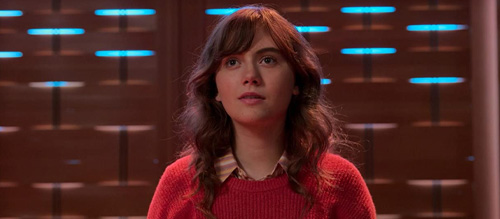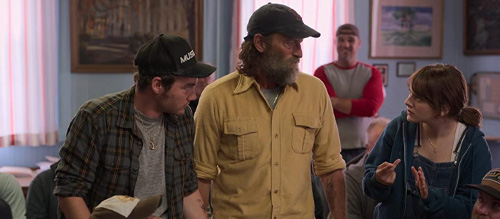CODA (2021) Review

CODA (2021)
Director: Sian Heder
Screenwriter: Sian Heder
Starring: Emilia Jones, Troy Kotsur, Daniel Durant, Marlee Matlin, Eugenio Derbez, Ferdia Walsh-Peelo
CODA, the latest film from writer-director Sian Heder (previously best known for ‘Orange is the New Black’ and Tallulah) is an English/American Sign Language remake of French comedy-drama La Famille Bélier. Heder’s film does one better right out of the gate by doing the deaf community the basic courtesy of casting deaf actors in the key roles, but it also serves up many more surprises in this tale of coming-of-age and chasing your dreams.
Massachusetts teenager Ruby (Emilia Jones) is a Child of Deaf Adults, acting as interpreter for her parents Frank and Jackie (Troy Kotsur and Marlee Matlin) and older brother Leo (Daniel Durant) around their local town, doubling up as radio operator on their fishing boat. But when Ruby belatedly embraces her love of singing and starts being tutored by her demanding choir master (Eugenio Derbez) for a highly competitive audition for a music school, she has to decide between pursuing her passions and supporting her family who are facing tough times ahead to keep their small business afloat.
It has been a big couple of years for mainstream deaf representation on film and TV. From hearing loss-centric stories like Sound of Metal to the prominence of characters played by deaf actors Alaqua Cox and Lauren Ridloff in Marvel’s ‘Hawkeye’ and Eternals, to even the boldness of an almost entirely silent episode of ‘Only Murders in the Building’ fronted by James Caverly. CODA star Troy Kotsur has commented in interviews on roles for deaf actors being limited and perfunctory, patronisingly using their difference as a plot device and as a source of pity. Clearly tides are turning in this regard, slowly but surely.
While criticisms from some deaf commentators and real-life Children of Deaf Adults of the Rossi family’s insular, selfish portrayal are understandable (Ruby’s mum is of the view that unless something can be enjoyed by the whole family on the same level then it shouldn’t be in their orbit), these are very human character flaws. Even aside from the harsh reality of the Rossis wanting to avoid the added financial burden of hiring a paid interpreter, people aren’t perfect, parents and children unintentionally hurt each other’s feelings all the time, and a kid’s need for independence is often at odds with a parent’s need to protect them.
Whether or not the family’s disappointing initial reaction to Ruby getting serious about something she is really good at rings true for you, the film still packs a big old emotional wallop with its genuine and natural performances, particularly that of lead Emilia Jones and the excellent central trio of Troy Kotsur, Marlee Matlin and Daniel Durant.

Matlin already has Oscar success behind her, becoming the first deaf winner of the Best Actress award for 1986’s Children of a Lesser God. Kotsur is an early favourite to receive similar recognition as the first deaf Best Supporting Actor winner at the 94th Academy Awards. If Emilia Jones’ Ruby is the heart of the film, then Kotsur as Frank is the soul, the tender scenes of father and daughter joking and being there for each other (especially a moment they share sitting on the tailgate of his truck under the stars) guaranteed to connect and linger in your mind for years to come.
What’s most refreshing about the film is that, through close script consultation with its cast and ASL advisers, this family are more than their deafness, though it is certainly a big part of who they are; they are allowed to be fully-rounded, flawed human beings filled with love but not immune to the petty squabbles, poor taste jokes and moments of thoughtlessness present in any family.
In one of the film’s funniest scenes, Ruby brings her duet partner and crush Miles (Sing Street’s Ferdia Walsh-Peelo) back to her house to rehearse, only to be interrupted by her parents having loud and passionate sex next door, unaware anyone else is home or (obviously) of the noise level they are producing. Everyone’s parents may have embarrassed their kids growing up, but the unique combination of circumstances leading to this moment pretty much guarantees Ruby has you beat.
Arguably, Daniel Durant’s Leo has fewer moments to shine in the film and it would have been nice to see a bit of of him navigating friendships and romances as one of the few deaf people in his home town. A couple of the film’s moments of conflict can be seen coming a mile off too, but if you think you’re going to get away without crying during the course of watching CODA, see how you’re doing after they tactically deploy a song by Joni Mitchell. If that still doesn’t get you then Ruby’s singing performance to her watching family will finish you off.
We’ve seen similar stories to CODA before; bittersweet, well-performed crowd-pleasers with morals and joy and sadness in equal measure. But seeing this story from this unique perspective, from this particular point of view, changes everything. Representation matters and every audience member seeing themselves on screen ensures the future of stories told on film. Come for the heart and the humour, stay to shed a few tears and to learn the ASL for rude words.
20/24

